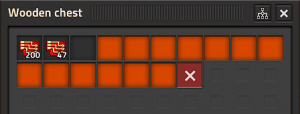Stack
A stack is the basic element in Factorio to store items. One space in an inventory can hold one stack.
Examples of stacks
- The player's inventory
- Main inventory
- Toolbelt (or quickbar)
- Tool-, armor-, weapon- and ammunition stacks
- Logistics trash slots
- The player's hand (is also a stack)
- Vehicles
- Chests: Best example outside the player's inventory; a chest is bascially just a group of stacks.
- Devices
- Furnace: Burner-, incoming and outgoing stack
- Assembling machines and Chemical plants: Several in- and one outgoing stacks, depending on the item assembled
- Labs
- Burner-based: Boiler, Burner mining drill, Burner inserter
- Roboport (filtered for robots and repair packs only)
- Gun turrets
- Special
- Inserter and Robots (they have some limited stacks, see stacksize bonus), so that they are able to move some items between stacks at once.
How do stacks work?
A stack can store a number of identical items.
The first inserted item determines which item-types can be stored. This also determines how many items can be stored (the number of items per stack depends on it's max stack size).
Only items can be stored within stacks, stacks cannot hold liquids or other inventories.
Stack size
The capacity, how much items a stack can store, which depends from the item. For example, Iron plates stack to 100, however Iron ore stacks to 50.
Filtered stacks
Stacks can be filtered either by default (in burner-type entities, furnaces, roboports, turrets, labs, and other entities that can only accept one or a few item types in a particular slot), or manually by the player, which is available for cargo wagons, the quickbar, and the player inventory (normally set via the middle mouse button / scroll-wheel click, see Keyboard bindings), but not for other types of containers (in particular, chests of any type).
This can be used to ensure only one item type goes into the inventory space. Inserters (or bots, where applicable) will not attempt to insert anything except the allowed item type into filtered slots, and manual insertion of other item types by the player is also not allowed unless and until the filter is cleared.
Damaged items
Damaged items will stack together with other damaged items, and the health of the stack will be the average health of all items in it. Damaged items will not stack with undamaged items.
Stack size bonuses
Inserters and logistic robots can be boosted with research to hold and transfer more items, see:
Stack limitation

Optionally, the usable space in chests and wagons can be decreased below their default values. Typically, this is done to store a small amount of items in an automated process, without consuming the resources that would be required to fill the entire container.
To limit a container, click the red X at the end of the last stack. Then, click on one of the stacks to set the new limit. The unused stacks will be highlighted red (see right).
When full, inserters will no longer add to a limited container. However, the player is still free to manually place items in the unused (red) slots.
Handling stacks
There are some keyboard bindings to handle movement of stacks between inventories fast, like moving half of a stack to another stack.
History
In v0.10, the number of items which can be stored in a stack changed for most items from dual numbers to decimal (base 2 vs. base 10). This change was mainly made because it is easier to calculate numbers based on the base-10-system.
Example: before that change, a stack could store 64 iron ore, after the change only 50. This change created a lot of controversy as some players preferred the old stack sizes.